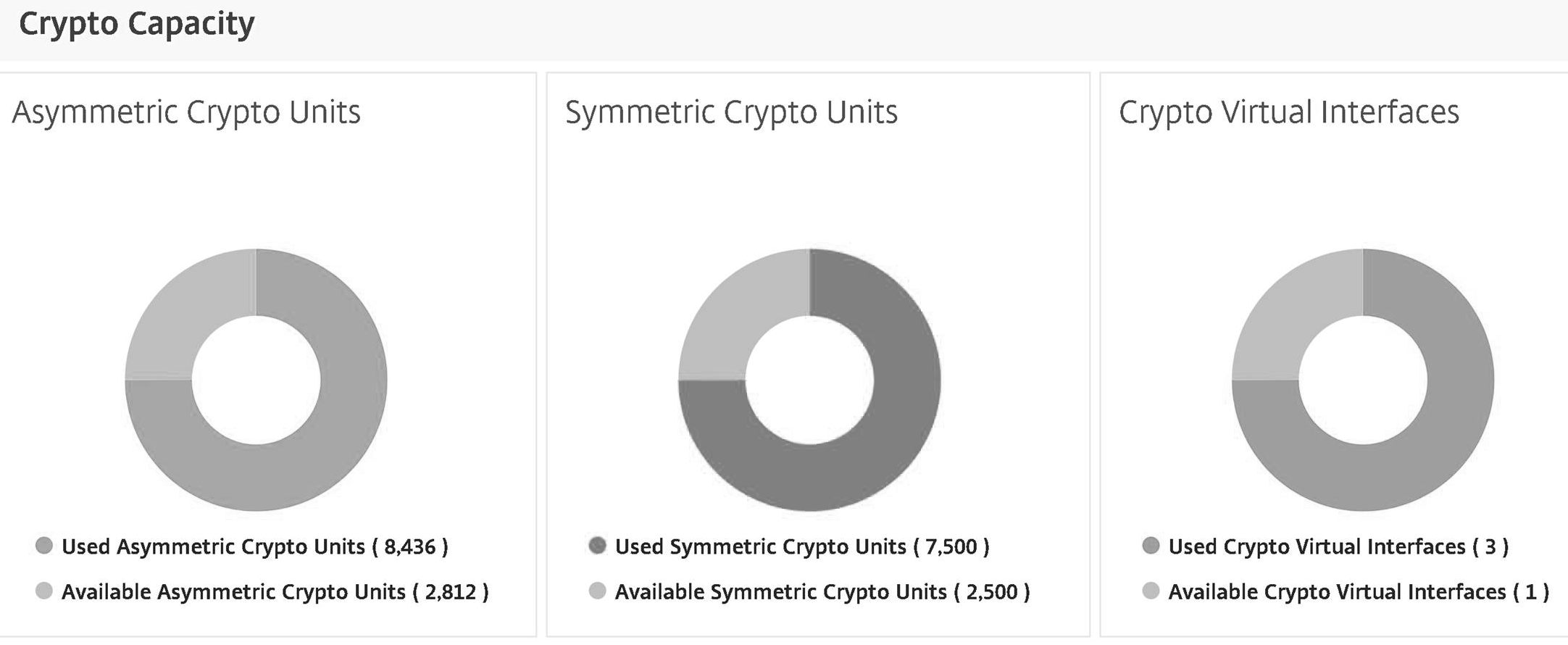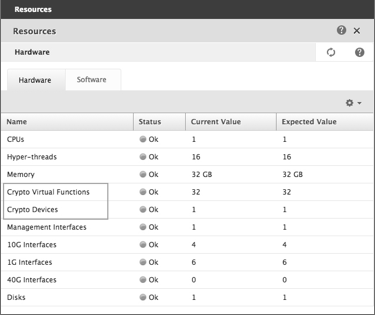Manage crypto capacity
Starting with release 12.1 48.13, the interface to manage crypto capacity has changed. The Management Service provides asymmetric crypto units (ACUs), symmetric crypto units (SCUs), and crypto virtual interfaces to denote SSL capacity on the NetScaler SDX appliance. Earlier crypto capacity was assigned in units of SSL chips, SSL cores, and SSL virtual functions. See the Legacy SSL chips to ACU and SCU conversion table for more information about how legacy SSL chips translate into ACU and SCU units.
By using the Management Service GUI, you can allocate crypto capacity to the NetScaler VPX instance in units of ACU and SCU.
The following table provides brief descriptions about ACUs, SCUs, and crypto virtual instances.
Table. Unit crypto units
| New crypto units | Description |
|---|---|
| Asymmetric crypto unit (ACU) | 1 ACU = 1 operation per second (ops) of (RSA) 2 K (2048-bit key size) decryption. For further details, see ACU to PKE resource conversion table. |
| Symmetric crypto unit (SCU) | 1 SCU = 1 Mbps of AES-128-CBC + SHA256-HMAC @ 1024B. This definition is applicable for all SDX platforms. |
| Crypto virtual interfaces | Also known as virtual functions, crypto virtual interfaces represent the basic unit of the SSL hardware. After these interfaces are exhausted, the SSL hardware cannot be further assigned to a VPX instance. Crypto virtual interfaces are read-only entities, and the SDX appliance automatically allocates these entities. |
View crypto capacity of the SDX appliance
You can view the crypto capacity of the SDX appliance in the dashboard of the SDX GUI. The dashboard displays the used and available ACUs, SCUs, and virtual interfaces on the SDX appliance. To view the crypto capacity, navigate to Dashboard > Crypto Capacity.

Allocate crypto capacity while provisioning the VPX instance
While provisioning a VPX instance on the SDX appliance, under Crypto Allocation, you can allocate the number of ACUs and SCUs for the VPX instance. For instructions to provision a VPX instance, see Provisioning NetScaler instances.
To allocate crypto capacity while provisioning a VPX instance, follow these steps.
-
Log on to the Management Service.
-
Navigate to Configuration > NetScaler > Instances, and click Add.
-
Under Crypto Allocation, you can view the available ACUs, SCU, and crypto virtual interfaces. The way to allocate ACUs and SCUs differs depending on the SDX appliance:
a. For the appliances listed in the Minimum value of an ACU counter available for different SDX appliances, you can assign ACUs in multiples of a specified number. SCUs are automatically allocated and the SCU allocation field is not editable. You can increase ACU allocation in the multiples of the minimum ACU available for that model. For example, if the minimum ACU is 4375, the ACU increment is 8750, 13125, and so on.
Example. Crypto allocation where SCUs are automatically assigned, and ACUs are assigned in multiples of a specified number.

Minimum value of an ACU counter available for different SDX appliances
| SDX platform | ACU counter minimum value |
|---|---|
| 22040, 22060, 22080, 22100, 22120, 24100, 24150 (36 ports | 2187 |
| 8400, 8600, 8010, 8015 | 2812 |
| 17500, 19500, 21500 | 2812 |
| 17550, 19550, 20550, 21550 | 2812 |
| 11500, 13500, 14500, 16500, 18500, 20500 | 2812 |
| 11515, 11520, 11530, 11540, 11542 | 4375 |
| 14xxx | 4375 |
| 14xxx 40S | 4375 |
| 14xxx 40G | 4375 |
| 14xxx FIPS | 4375 |
| 25xxx | 4375 |
| 25xxx A | 4575 |
b. For the rest of the SDX platforms, which are not listed in the preceding table, you can freely assign ACUs and SCUs. The SDX appliance automatically allocates crypto virtual interfaces.
Example. Crypto allocation where both ACU and SCUs are freely assigned

4./ Complete all the steps for provisioning the VPX instance, and click Done. For more information, see Provisioning NetScaler instances.
View crypto hardware health
In Management Service, you can view the health of the crypto hardware provided with the SDX appliance. The health of the crypto hardware is represented as Crypto Devices and Crypto Virtual Functions. To view the health of the crypto hardware, navigate to Dashboard > Resources.

Points to note
Keep the following points in mind when you upgrade the SDX appliance to the latest version.
-
Only the SDX user interface gets upgraded, but the hardware capacity of the appliance remains the same.
-
The crypto allocation mechanism remains the same, and only the representation on the SDX GUI changes.
-
Crypto interface is backward compatible, and it does not affect any existing automation mechanism that uses the NITRO interface to manage the SDX appliance.
-
Upon SDX appliance upgrade, the crypto assigned to the existing VPX instances does not change; only its representation on the Management Service changes.
ACU to PKE resource conversion table
| SDX platform | ACU | RSA-RSA1K | RSA-RSA2K | RSA-RSA4K | ECDHE-RSA | ECDHE-ECDSA |
|---|---|---|---|---|---|---|
| 22040, 22060, 22080, 22100, 22120, 24100, 24150 (36 ports) | 2187 | 12497 | 2187 | 312 | 256 | 190 |
| 8400, 8600, 8010, 8015 | 2812 | 17000 | 2812 | 424 | 330 | N/A |
| 11515, 11520, 11530, 11540, 11542 | 4375 | 25000 | 4375 | 625 | 512 | 381 |
| 22040, 22060, 22080,22100, 22120 (24 ports) | 4375 | 25000 | 4375 | 625 | 512 | 381 |
| 17500, 19500, 21500 | 2812 | 17000 | 2812 | 424 | 330 | N/A |
| 17550, 19550, 20550, 21550 | 2812 | 17000 | 2812 | 424 | 330 | N/A |
| 11500, 13500, 14500, 16500, 18500, 20500 | 2812 | 17000 | 2812 | 424 | 330 | N/A |
| 14000, 14000-40G, 25000, 25000A | 4375 | 25000 | 4375 | 625 | 512 | 381 |
| 14000 FIPS | 4375 | 25000 | 4375 | 625 | 512 | 381 |
| 14000-40S | 4375 | 25000 | 4375 | 625 | 512 | 381 |
| *8900 (8910, 8920, 8930) | 1000 | 4615 | 1000 | 136 | 397 | 494 |
| *9100 (9110, 9120, 9130) | 1000 | 4615 | 1000 | 136 | 397 | 494 |
| *26000-100G (26100, 26160, 26200, and 26250) | 1000 | 4615 | 1000 | 136 | 397 | 494 |
| *15000 | 1000 | 4615 | 1000 | 136 | 397 | 494 |
| *15000-50G | 1000 | 4615 | 1000 | 136 | 397 | 494 |
| *16000 | 1000 | 4615 | 1000 | 136 | 397 | 494 |
| *26000-50S | 1000 | 4615 | 1000 | 136 | 397 | 494 |
*On these platforms the PKE numbers are the minimum guaranteed values.
How to read the ACU to PKE resource conversion table
The ACU to PKE resource conversion table is based on the following points:
-
Management Service helps allocate Crypto Resources to each individual VPX. Management Service cannot allocate or promise performance.
-
Actual performance varies depending on packet size, cipher/Keyex/HMAC (or their variations) used, and so on
The following example helps you understand how to read and apply the ACU to the PKE resource conversion table.
Example. ACU to PKE resource conversion for the SDX 22040 platform
Allocation of 2187 ACUs to a VPX instance on an SDX 22040 platform allocates crypto resource equivalent to 256 ECDHE-RSA operations or 2187 RSA-2K operations and so on.
Legacy SSL chips to ACU and SCU conversion table
For more information about how legacy SSL chips are converted to ACU and SCU, see the following table.